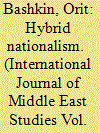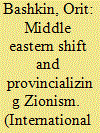|
|
|
Sort Order |
|
|
|
Items / Page
|
|
|
|
|
|
|
| Srl | Item |
| 1 |
ID:
104157


|
|
|
|
|
| Publication |
2011.
|
| Summary/Abstract |
This paper analyzes Iraqi national narratives in the years from 1958 to 1961 to consider how innovative definitions of Arab nationalisms were affected by worldwide processes of decolonization. It demonstrates how Pan-Arabism was transformed in Qasimite Iraq because of its hybridization with Iraqi patriotism and, concurrently, how various elements of Arabist discourses were integrated into local and patriotic perceptions of Iraqi nationalism. Examining cultural idioms shared by Iraqi intellectuals belonging to different political groups, especially the communists and the Ba?thists, destabilizes a typology that assumes each ideological camp subscribed to a rigidly defined set of well-known historical narratives. The Pan-Arabists in this period often cultivated the notion that Arab nationalism did not entail an ethnic origin but rather the ability to adopt the Arabic language, as well as Arab history and culture, as a marker of one's national and cultural identity. The attempts to adapt Pan-Arab discourses to the specificities of the Iraqi milieu and to build coalitions with as many of the nation's groups as possible meant that the sectarian, anti-Shi?i, and anti-Kurdish notions that colored Ba?thist discourses in later years were not as prominent in this period.
|
|
|
|
|
|
|
|
|
|
|
|
|
|
|
|
| 2 |
ID:
097523


|
|
|
|
|
| Publication |
2010.
|
| Summary/Abstract |
This article offers a literary analysis of the novel The Hand, the Land and the Water (Al-Yad wa'l ard aa'l ma'), written by communist intellectual Dhu Nun Ayyub (b.1908). I read this novel in an attempt to analyze the boundaries between Baghdad and countryside (al-rif), as understood by the novel's protagonists, and to underscore the ways in which such boundaries were not only constructed, but also crossed and challenged. The novel conveys many themes that occupied the Iraqi leftist intelligentsia at the time, such as the abuse of peasants by their sheikhs and by the state. It was one of the first fictional representations of the Wathba, and thus can be seen as an endeavour to understand the meanings of this very important moment in Iraqi history.
|
|
|
|
|
|
|
|
|
|
|
|
|
|
|
|
| 3 |
ID:
133303


|
|
|
|
|
| Publication |
2014.
|
| Summary/Abstract |
Scholars working on Jewish communities in the Middle East are in the midst of an important historiographical moment, in which the major categories, historical narratives, and key assumptions within the field are undergoing radical changes. A cluster of books and articles written by scholars trained in history, anthropology, and area studies departments, and published in Middle East studies rather than Jewish studies book series and journals, suggests that the study of Middle Eastern Jewish communities in the American academy is undergoing a change which might be termed "the Middle Eastern turn." For such scholars, the history of Jews in Muslim lands, as modern subjects and citizens, is typified by a multiplicity of categories related to their identities-Ottoman, Sephardi, Mizrahi, Arab-Jewish, and local-patriotic-which they explore by looking at the political organizations and social and cultural institutions that enabled the integration of modern Jews into new imperial and national frameworks. This new scholarly wave is transnational, as it illustrates the importance of Jewish networks and Jewish languages in the Middle East, and likewise seeks to draw comparisons between Jews and other transregional and religious minorities, such as Armenians and Greek Orthodox Christians. It is interdisciplinary, as it attempts to incorporate the insights of sociologists, anthropologists, and literary scholars. Finally, it is postcolonial, in its critiques of national elites, national narratives, and nationalist histories. These new accounts uncover how processes which affected the entire Middle East, like Ottoman and Egyptian reform politics and the rise of nation-states, shaped modern Jewish lives.
|
|
|
|
|
|
|
|
|
|
|
|
|
|
|
|
| 4 |
ID:
163885


|
|
|
| 5 |
ID:
148182


|
|
|
|
|
| Summary/Abstract |
This article explores the protests, demonstrations, and sit-ins organized by Iraqi Jews in Israel during the 1950s. Protesting their living conditions and discrimination by the state, Iraqi Jews traveled from their transit camps to urban centers, demanding housing, employment, education, and access to water and electricity services. I argue that the protests challenged both the invisible borders between cities and transit camps and the notion that Jews' exodus from Iraq signified a liberation from exile. The protesters offered a different narrative, in which their struggle to achieve social mobility and civil rights had actually begun upon arrival to Israel.
|
|
|
|
|
|
|
|
|
|
|
|
|
|
|
|
|
|
|
|
|